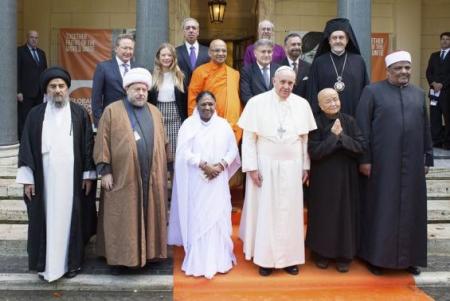End Human Slavery by 2020: Pope Francis, World Religious Leaders Commit to Freeing Millions of People 'In Chains'

Pope Francis and several of the world's leading religious leaders joined together in a pledge to end human slavery by 2020, focusing on the tens of millions of people "in chains" due to human trafficking and forced labor.
"The physical, economic, sexual and psychological exploitation of men and women, boys and girls, is chaining tens of millions of persons to inhumanity and humiliation," the pope said and signed the pledge to do "all in our power, within our faith communities and beyond" to end modern slavery by 2020.
The signatories of the declaration included Anglican Archbishop Justin Welby of Canterbury; Rabbi David Rosen, international director of interreligious affairs for the American Jewish Committee; Ayatollah Mohammad Taqi al-Modarresi, an influential Shiite scholar; Ecumenical Patriarch Bartholomew of Constantinople, as well as representatives for Ahmad el-Tayeb, a grand imam from Egypt.
Francis called modern slavery "an atrocious plague," speaking at a ceremony on Tuesday on the U.N. Day for the Abolition of Slavery, according to Catholic News Service.
The Walk Free Foundation, an Australia-based human rights group, reported last month in its global slavery index that there are close to 36 million people living as slaves, or forced into brothels.
"We pledge ourselves here today to do all in our power, within our faith communities and beyond, to work together for the freedom of all those who are enslaved and trafficked so that their future may be restored," the declaration read.
"Today we have the opportunity, awareness, wisdom, innovation and technology to achieve this human and moral imperative," it added.
The multi-faith initiative was started by the Global Freedom Network, which in March first brought together the Vatican, the Anglican Communion, and el-Tayeb's Al-Azhar University in Cairo.
The Roman Catholic Church leader thanked the religious leaders who gathered on Tuesday to sign the document, calling it an "act of fraternity" for the many women, men and children who are exploited for personal or commercial gain.
"We cannot tolerate that the image of the living God" present in every human being "is subjected to this most abominable form of trafficking," Francis said.
The other religious leaders also sounded off on the crisis, with Hindu leader Mata Amritanandamayi noting that she has heard the stories of suffering of hundreds of victims. She said that "if we fail to do something, it will be a travesty against future generations."
Thich Nhat Hanh, a Zen Buddhist leader, added that compassion must also be extended to the traffickers, arguing that they also have suffered. He called on activists to "help them wake up" from the wrong they are committing.
Welby added that people can avoid the exploitation of others with their "own actions and choices as consumers and users of financial services whose managers can put great pressure on companies in which they invest."
Francis has spoken out a number of times against human slavery during his papacy. Back in June, the Vatican leader warned human traffickers that they will be held accountable for their crimes.
"One day everything comes to an end and they will be held accountable to God," the pope said about those responsible for human trafficking, slave labor and arms manufacturing, also calling them "merchants of death."
Speaking on the eve of the World Day Against Child Labor, the pontiff pleaded for the "tens of thousands of children who are forced to work in degrading conditions, exposed to forms of slavery and exploitation, as well as abuse, mistreatment and discrimination."






















